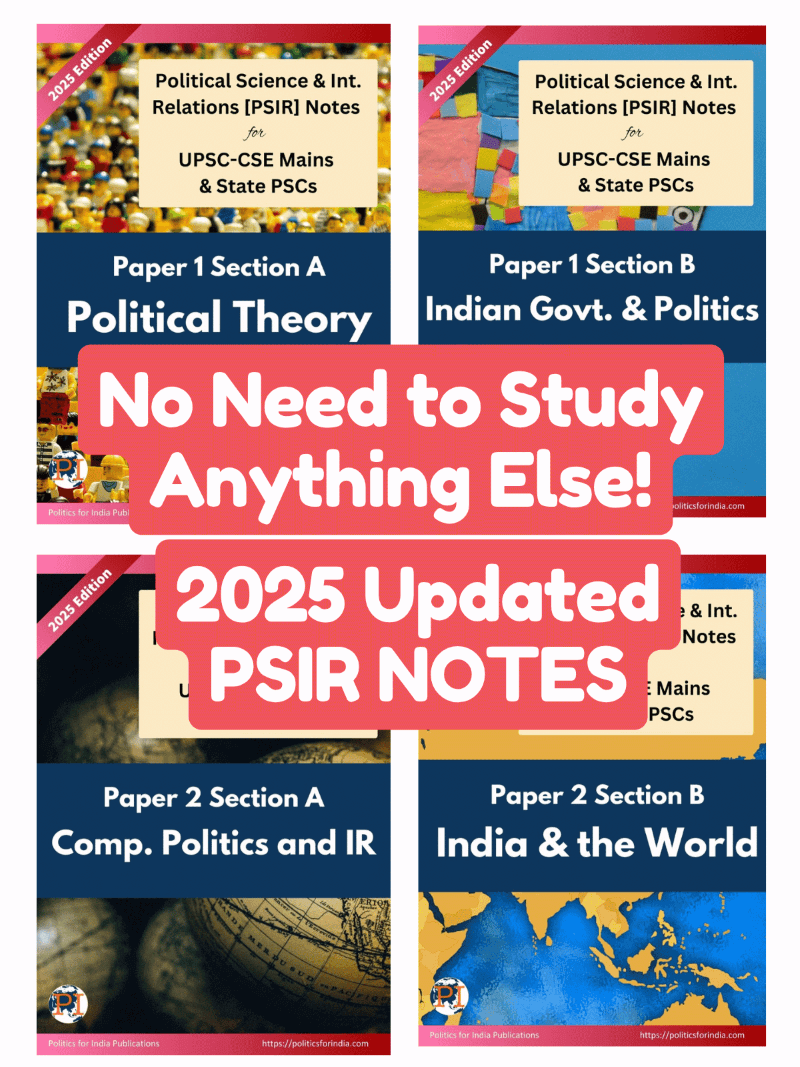Test Series in one of the integral part of UPSC Mains Preparation. A test series not only provides regular practice but also simulates exam conditions, helping you build the discipline, stamina, and skills needed to score in actual exam.
In this article, we’ll walk through how to begin your PSIR test series journey. We will cover why you should start writing with whatever knowledge you have (instead of waiting for perfection), how to stick to a test schedule no matter what, and how regular answer writing will naturally improve your skills. We’ll also discuss managing time in tests, building real exam stamina, and insights on what works and what pitfalls to avoid.
Whether you’re a first-timer or repeating the attempt, let this serve as a friendly roadmap to kickstart your PSIR test series preparation. Remember, every topper was once where you are now – unsure about writing answers – but they improved by practicing and persisting. Now it’s your turn to take that first step. Let’s dive in!
Write with What You Have, Not What You Wish You Had
One of the biggest hurdles in answer writing is the mistaken belief that you must have “complete” notes or perfect content before you start writing answers. This leads many aspirants to keep postponing answer practice. “Don’t wait for perfect notes or perfect time to write answers, it will never come.”
Instead of chasing an unattainable ideal of “perfect” preparation, start writing answers with the knowledge and notes you currently have.
Why is this so important? For one, writing itself highlights the gaps in your understanding far better than passive reading. You might think you need more content, but often you already have enough to attempt a question – the act of writing will reveal how to use that content effectively.
Secondly, answer writing is a skill that improves only with practice; delaying it means delaying skill development. Don’t try to master the entire syllabus in one go or wait till your notes are encyclopedic. Begin by answering questions using whatever understanding you have – even if it’s incomplete. You will learn and fill the gaps as you go.
The key is to just start writing. Pick a question (maybe from previous years or your test series) and attempt it. Your answer might not be great – that’s okay. The first step is breaking the inertia.
Over time, content can be improved and expanded, but only if you begin putting pen to paper now. Remember, an average answer written now is better than a perfect answer never written.
Stick to the Schedule – Discipline Over Perfection
When joining a PSIR test series, consistency and discipline are your best friends. It’s crucial to write your tests as per the given schedule no matter what, rather than postponing a test because you feel “not fully prepared”.
Many aspirants fall into the trap of skipping or delaying mock tests in pursuit of finishing one more book or making better notes. This is a deadly trap! Following the test schedule religiously will instil discipline and keep your preparation on track, whereas waiting for the “perfect moment” will only breed procrastination.
In practical terms, treat each test date as non-negotiable – just as the actual UPSC exam date is fixed. Even if you feel underprepared, sit for the test. In other words, showing up regularly is more important than showing up perfectly.
Understand that the purpose of the test series is practice and improvement, not getting top marks right now. Don’t be embarrassed by low scores in initial tests – treat them as feedback, not judgment. The real failure would be not attempting at all.
In fact, consistency also boosts confidence: as you honour your schedule and see yourself attempting papers regularly, your anxiety about the mains exam will decrease. Consistency trumps intensity – it’s better to write tests regularly, even if your preparation isn’t “perfect”, than to wait for perfection and write none.
Practice Makes Progress: Improvement Through Consistent Writing
Answer writing is an art perfected over time. Don’t worry if your early answers are not well-structured or if you struggle to articulate ideas – this is natural. The good news is that with consistent practice and reflection, you will get better at structuring and expressing your answers. Think of each test and each answer as a workout for your brain’s writing muscles. Over weeks and months, these muscles get stronger.
Regular answer writing has multiple benefits. First, it improves articulation and clarity. By writing again and again, you learn how to convey complex political theories or international relations concepts in simpler words under time pressure. You’ll find that you start making your sentences shorter and more impactful, and you’ll develop a flow in writing.
Secondly, consistent practice helps you internalize an answer structure. A typical UPSC answer needs a brief intro, a well-organized body, and a concise conclusion. Initially, you might struggle with this format – maybe your answers are too scattered or lack a conclusion. But by the tenth or twentieth answer you write, you’ll start structuring almost automatically. You’ll also get better at addressing all parts of a question in an organized way. In PSIR, where answers are often written in paragraphs rather than bullet points, this structured flow is critical.
Another area of improvement is the use of examples, scholars, and keywords. With each practice test, you might discover, say, that your answer on Marxism lacked a mention of a specific scholar – you note it, and next time it comes naturally. Over time your answers become richer and more nuanced, without you consciously memorizing anything new – simply because writing helped cement those details in your memory. Incorporating daily answer writing (and subsequently reviewing model answers) is pivotal in refining content and boosting marks from an average score to a top score in PSIR.
Finally, consistent writing practice dramatically improves your speed and time management (more on that soon). Early on, you might struggle to complete papers, but by the end of a test series, most aspirants find they can finish on time because they have been training for it regularly. It’s just like running practice before a marathon – each test is a practice run building your endurance.
Taking Extra Time Initially
When you’re just starting out with writing full-length tests, it’s okay to give yourself a little flexibility with time in the first couple of mocks. In your very first test or two, the goal is to break the ice and get the feel of writing answers, not to perfectly simulate exam constraints. If you find you need an extra 30 minutes or even an hour to complete the paper or formulate your answers properly in these initial trials, take it.
However, this flexibility is only a temporary crutch. Do not get too comfortable taking extra time, especially if you’ve qualified Prelims and preparing for Mains. After one or two such practice tests, you must start transitioning to real-time conditions. This extra time is like training wheels, going forward, you need to remove them.
UPSC Mains is a race against time, and you won’t have any extra minute in the actual exam. Sticking to time limits in your practice tests builds the necessary discipline and conditions your mind and body to perform under exam pressure.
In fact, in our PSIR Test Series, if aspirants exceed the allotted time after the first couple of tests, there will be marks deducted as a penalty. It is done to intentionally done to push you out of your comfort zone and mimic the real exam scenario. When you know that writing beyond 3 hours will cost you marks in the mock, you’ll train yourself to pick up speed and prioritize effectively.
Completing Paper on Time
You need a strategy that you have though of and tested to ensure that you finish paper on time.
There are five 50-marker questions in PSIR Test. Accordingly, you can give 36 minutes for each 50 marker question. If you break it down further – for 10 marker, you can give 7 minutes, 10 minutes for a 15 marker and 15 minutes for a 20 marker question. Accordingly, you should set milestones in your writing. Check them in between the test to assess your progress and adjust the speed.
Also, treat mock tests as a real exam – sit in one place continuously for 3 hours, and don’t use notes or anything else. If you don’t know something, make a reasonable attempt and keep going. This builds your question-solving instinct and speed.
We even recommend to to intentionally create a slightly stressful environment – for example, sit upright at a desk, get water-bottle and wristwatch, imagine this is the real deal. It might sound odd, but these little tricks condition you to remain calm and focused when the actual pressure hits.
By enforcing strict time limits in practice, you’ll transform yourself from an aspirant who can write good answers into one who can write good answers in limited time, which is the only thing that counts in the exam.
It might be uncomfortable at first – you might feel you’ve written only mediocre answers because of the time crunch – but that discomfort is exactly where growth happens.
Build Real Exam Stamina
UPSC Mains is often described as a marathon – it requires not just knowledge but endurance and focus. Think of your PSIR test series as a series of simulated battles preparing you for the final war. Each full-length test you sit for 3 hours is strengthening your writing muscles. Initially, writing for 3 hours at a stretch can feel exhausting – your hand aches, your mind feels drained, and by the last question your thoughts might be all over the place.
But with repeated practice, your capacity increases. The more 3-hour mock exams you write, the more 3-hour exams you can handle. By the time you reach the real Mains, writing continuously won’t faze you – it will be almost routine.
Stamina is not just physical (though writing longhand is indeed a physical task); it’s also mental. You need the mental resilience to handle tough or unexpected questions at the end of a tiring paper. Practicing under exam conditions trains you to keep a cool head in the last 30 minutes, when many aspirants start to panic. You learn how to quickly structure an answer even when your brain is screaming “I’m tired!” and how to keep your handwriting legible till the last page.
To boost your exam stamina further, incorporate small habits alongside test series: practice writing 2-3 answers in one sitting daily (to build up to writing 20 answers in one go), and take care of your health (stay hydrated, maybe do some hand exercises or general fitness – a healthy body supports an active mind during those long hours).
By the end of a rigorous PSIR test series, you should feel like you’ve essentially been through the exam multiple times. The actual exam day will then feel like just another mock – one more, albeit important, practice run. That confidence and endurance can make all the difference in scoring those extra marks that lift you from average to topper.
Conclusion: Trust the Process and Keep Writing
In the journey of UPSC, the PSIR test series is your friend, mentor, and evaluator all in one. Embrace it fully. Write sincerely, review diligently, improve gradually, and stay disciplined. Be kind to yourself on this journey – celebrate small wins and don’t dwell too long on setbacks (learn and move on). With the right mindset and consistent effort, you will see transformation in your answer writing and confidence.
Now, pick up your pen and start with the next test! The road to PSIR mastery and Mains success is built on those hours of practice. You’ve got this – one answer at a time, one test at a time. Good luck, and happy writing!
A Final Note Before You Proceed
Before you rush to join any test series after reading this article, pause for a moment. Joining a test series is not a magic fix — it’s only effective when approached with the right mindset. First, understand what has been shared above. Digest the points carefully — especially about consistency, discipline, and writing with what you have. Then take a thoughtful call based on your stage of preparation.
If you are preparing for next year’s Mains, know that there’s little value in joining a test series unless you have done at least two full readings of the PSIR syllabus. Without that foundational familiarity, the tests may overwhelm you more than help. Focus first on building a base. (Read here – Getting started with PSIR Preparation)
If you are giving the upcoming Mains, you don’t have the luxury of waiting. Time is limited — and a test series is one of the best ways to simulate the real pressure and train yourself. In that case, it’s not about being fully ready, but about getting started — now.
But again, this doesn’t mean you must join any institutions’ test series and that it’s the only way. You can even opt for self-evaluation using previous years’ test papers, or borrow questions from a test series your friend has joined. The core idea is to start writing regularly and to evaluate your progress honestly — the format or source matters less than the habit itself. Best wishes once again!















